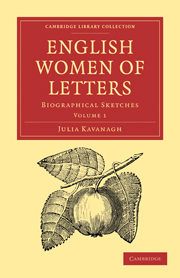Summary
There are disadvantages which natural powers, though great, rarely conquer, and one of the greatest is an imperfect education. That of women was neglected, as a general rule, when Mrs. Radcliffe was young, and even when she wrote. There were well-bred ladies who knew not how to spell, and to write decent English was not always one of the accomplishments of the fair sex. Their knowledge, such as it was, rarely went far or deep—opinion, prejudice, and society restricted it within the narrowest bounds, and, as a rule, women lacked that culture from within, without which even genius can achieve no perfect work.
There are in Mrs. Radcliffe's writings passages of great beauty, told in beautiful language, but these productions, one and all, betray a mind which had long lain dormant, and that wakened too late to the consciousness of great gifts. In this she reminds us of her cotemporary, Mrs. Inchbald; but the beauty and the actress, though in many respects far more deficient than Mrs. Radcliffe, had a clear, practical knowledge of life which stood her in stead of much. The authoress of “The Italian” and of “The Mysteries of Udolpho” had only Nature, which she loved tenderly and painted with extraordinary power, and Terror, which she knew wonderfully how to waken. There lay her strength, and it was great.
In character, in penetration, in historical knowledge, in all the minutiæ that prove reading, skill, and a cultivated taste, she failed.
- Type
- Chapter
- Information
- English Women of LettersBiographical Sketches, pp. 253 - 287Publisher: Cambridge University PressPrint publication year: 2010First published in: 1863

